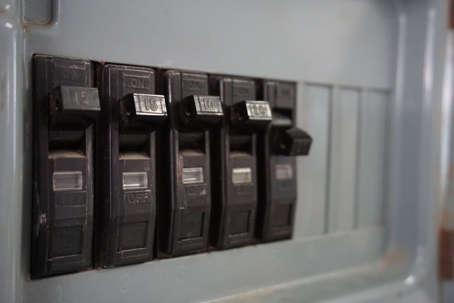To understand whether or not your circuit breaker panel needs to be replaced, it’s helpful to first understand what your circuit breaker panel does. Its function is actually contained within its name.
How Does a Circuit Breaker Work?
When there’s a risk of an electrical overload, the circuit breaker panel works by breaking the electrical circuit, thereby cutting off the power to prevent the overload from occurring. This prevents spikes of power that could harm your appliances or worse--start an electrical fire in your home.
Circuit Breaker Repair vs. Replacement
Even if your circuit breaker panel trips frequently, you may only need a repair, rather than a replacement. You can follow these steps to get a better idea if repairs or a replacement are in order (or you can call an electrician upfront).
How to Check a Circuit Breaker
- Step 1: Find your circuit breaker panel. They’re usually located in a utility closet or basement.
- Step 2: Locate the breaker that keeps tripping, and see if you can figure out which circuit it protects in your house. If there is a circuit directory on or near the panel, it might tell you which appliances are on each circuit, which will be very helpful for Step 3…
- Step 3: Unplug all of the appliances on the circuit whose breaker keeps tripping.
- Step 4: Go back to the breaker and reset it by firmly switching it to the “On” position. (If it doesn’t click firmly between “On” or “Off” then the breaker needs to be replaced.)
Assuming you were able to switch the breaker to the “On” position, one of two issues will occur.
What Causes a Circuit Breaker to Trip?
- Issue 1: The breaker will trip back to the “Off” position almost right away. This indicates that either the breaker needs to be replaced or that there’s a short circuit that will need to be fixed.
- Issue 2: The breaker won’t trip immediately, but it will trip again once you’ve starting plugging in and running your appliances. This indicates that there is either a short circuit or that there’s an electrical overload occurring. An overload may be occurring if an appliance or combination of appliances are pulling more power than the circuit breaker can allow at any one time.
If you are experiencing an electrical overload, an electrician may be able to solve the problem by creating a dedicated circuit for the appliance that needs a lot of power. Water heaters, dishwashers, air conditioners, and refrigerators are just a few examples of appliances that will need a dedicated circuit.
Regardless of whether or not you need to replace your circuit breaker panel, to prevent danger to yourself and your home, calling an electrician is the best option. They can fix any short circuits or install a new circuit breaker panel if needed.
Signs of a Bad Circuit Breaker
Even though circuit breaker panels are designed to last many years, some breakers can go bad due to old age but also overheating. Intense summer heat can be the culprit in some cases, so keep an eye on your panel during the warmer months.
What Are the Signs of a Bad Breaker?
- The breaker is hot when you touch it.
- The electrical panel or breaker emits a burning smell. Shut off the main power to your house at once if you encounter this. Then call an electrician.
- There’s visible wear or physical damage. This could look like melted or frayed wires or scorch marks around the breaker or an outlet. If you see these signs, unplug everything on that circuit right away.
- The breaker continually trips
Ensuring that your circuit breaker panel is functioning properly will give you peace of mind. The panel provides your home with a vital piece of protection against smoke or fire damage caused by electrical overloads.
If a breaker keeps tripping on your circuit breaker panel or if you see any signs of a bad breaker, give All Electric Services a call at (407) 890-7782. Our certified electricians can help you identify the cause of the problem, as well as the safest solution. Contact us online today!

